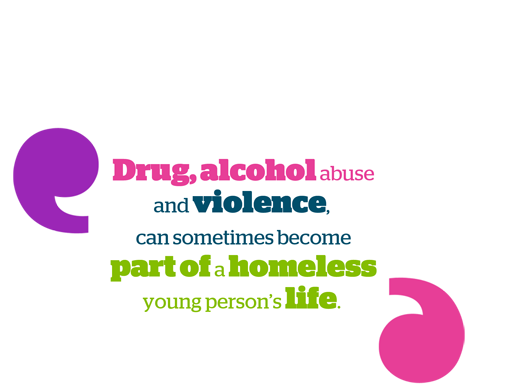Homelessness has a serious impact on every aspect of the life of a young person. Many describe their lives as being 'on hold' while they are homeless, making it much harder for them to achieve their goals and ensure their own well-being. Young homeless people can lack confidence, motivation and a sense of purpose which not only negatively affects their mental health but leads to an apathy in seeking help and caring for themselves.
"Young homeless people often do not consider their health and well-being to be a problem or priority for them."
Other issues such as the need for housing and employment are far more pressing. Many young homeless people go to desperate measures to avoid sleeping rough, including committing crime or resorting to sex work to get a roof over their head. Drug, alcohol abuse and violence can sometimes become part of a homeless young person’s life. Apart from the obvious issues around eating well, getting enough sleep, keeping warm and dry, violence, risk of exploitation and harm are real dangers.
Homeless people often face multiple health problems and those with mental health problems are particularly at risk. Homeless people face great inequalities in accessing mental health services, yet their mental health often suffers as a result of being homeless.
"The biggest cause of homelessness for young people is being told to leave the family home by their parents."
Other common causes are leaving care and being unable to pay rent. Many do not have a network of support and both mental and physical health can suffer.
There are an estimated 2,300 young runaways in Essex*. Young homeless people are considerably more vulnerable than the overall homeless population. Up to half of single homeless young people have been in care, 40% have experienced abuse at home and 33% self-harm. Leaving home before you are 18 is a serious step and should not be taken lightly. Think about involving a mediator or social care professional to help you talk to your parents or carers to see whether things can be sorted out before you get to this stage.
* Essex Needs Assessment for Schools, Children and Families
Sources: www.homeless.org.uk www.crisis.org.uk






